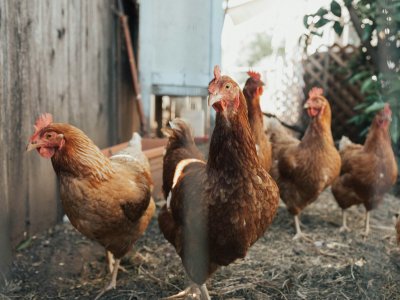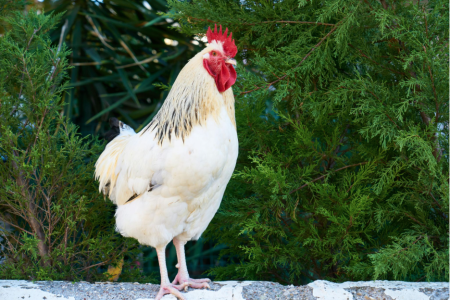Thinking of getting chickens to save on eggs? Read this first!
By
Aubrey Razon
- Replies 0
With egg prices soaring, many Americans are thinking about raising their own chickens. The idea sounds simple, but there’s more to it than just fresh eggs.
Is backyard farming really the money-saving solution you think it is?
With egg prices soaring to an average of $4.95 per carton in January, more people are considering raising their own chickens.
The sharp increase is largely due to the H5N1 bird flu outbreak, which has led to the culling of millions of chickens nationwide.
With supply dwindling and production costs rising, consumers are feeling the impact at the grocery store.
As a result, hatcheries are seeing a surge in demand from individuals hoping to cut costs by producing their own eggs at home.

Ron Goldsmith, who has witnessed a dramatic increase in chicken feed sales at his pet store, Mike's Feed Farm in Riverdale, New Jersey, reflects this trend.
Similarly, companies like Rent The Chicken have capitalized on the situation by offering hens for rent, allowing consumers to try their hand at chicken keeping without a long-term commitment.
Kathy Shea Mormino, affectionately known as the “chicken chick,” has been raising chickens in her Connecticut backyard for two decades.
She cautions that while the idea of home-raised eggs is appealing, the reality involves significant time, money, and responsibility.
From the initial investment in a coop and chicks to the ongoing cost of feed and care, the expenses can quickly add up to thousands of dollars.
In contrast, buying a dozen eggs each week at the grocery store would cost about $300 annually.
Mormino emphasizes that chickens are not “PEZ dispensers” of eggs; their productivity depends on factors such as health, age, and season.
Moreover, not all municipalities permit chicken keeping, and there may be restrictions on coop location, the number of birds, and more.
It's essential to research local regulations and consider whether your lifestyle is compatible with the demands of raising chickens.
For those looking to save on egg costs without the commitment of raising chickens, there are other strategies to consider.
Experts at Good Housekeeping suggest using substitutes like a quarter cup of Greek yogurt or the liquid from a can of chickpeas in baking recipes.
These alternatives can help stretch your egg supply further during times of high prices.
The threat of bird flu remains a significant concern for backyard flocks.
Mormino warns that the virus is primarily spread by migratory waterfowl, and something as simple as walking through contaminated droppings can introduce the disease to your home.
With over 162 million birds affected nationwide, biosecurity measures are crucial for protecting your chickens from this deadly disease.
Also read: Turkey steps up: A bold move to keep US egg supplies cracking!
The United States Department of Agriculture (USDA) has acknowledged the challenges posed by the bird flu and is taking steps to combat the outbreak.
This includes efforts to rehire experts who were previously let go, ensuring that the necessary knowledge and resources are available to address the situation effectively.

If you're contemplating getting chickens to combat the egg price hike, take a moment to consider the full picture.
Raising chickens is not a guaranteed cost-saving measure and comes with its own set of challenges and responsibilities.
Do your research, understand the risks, and consider alternative ways to manage your egg expenses.
Your wallet—and potentially your future feathered friends—will thank you for making an informed decision.
 Have you ever raised chickens, or would you consider it now? Do you think keeping backyard chickens would actually save money in the long run? Have you found any creative ways to cut costs on groceries lately?
Have you ever raised chickens, or would you consider it now? Do you think keeping backyard chickens would actually save money in the long run? Have you found any creative ways to cut costs on groceries lately?
Share your insights with us in the comments below.
Is backyard farming really the money-saving solution you think it is?
With egg prices soaring to an average of $4.95 per carton in January, more people are considering raising their own chickens.
The sharp increase is largely due to the H5N1 bird flu outbreak, which has led to the culling of millions of chickens nationwide.
With supply dwindling and production costs rising, consumers are feeling the impact at the grocery store.
As a result, hatcheries are seeing a surge in demand from individuals hoping to cut costs by producing their own eggs at home.

The H5N1 strain of bird flu has affected over 162 million birds in the US. Image source: Ben Moreland/Unsplash.
Ron Goldsmith, who has witnessed a dramatic increase in chicken feed sales at his pet store, Mike's Feed Farm in Riverdale, New Jersey, reflects this trend.
Similarly, companies like Rent The Chicken have capitalized on the situation by offering hens for rent, allowing consumers to try their hand at chicken keeping without a long-term commitment.
Kathy Shea Mormino, affectionately known as the “chicken chick,” has been raising chickens in her Connecticut backyard for two decades.
She cautions that while the idea of home-raised eggs is appealing, the reality involves significant time, money, and responsibility.
From the initial investment in a coop and chicks to the ongoing cost of feed and care, the expenses can quickly add up to thousands of dollars.
In contrast, buying a dozen eggs each week at the grocery store would cost about $300 annually.
Mormino emphasizes that chickens are not “PEZ dispensers” of eggs; their productivity depends on factors such as health, age, and season.
Moreover, not all municipalities permit chicken keeping, and there may be restrictions on coop location, the number of birds, and more.
It's essential to research local regulations and consider whether your lifestyle is compatible with the demands of raising chickens.
For those looking to save on egg costs without the commitment of raising chickens, there are other strategies to consider.
Experts at Good Housekeeping suggest using substitutes like a quarter cup of Greek yogurt or the liquid from a can of chickpeas in baking recipes.
These alternatives can help stretch your egg supply further during times of high prices.
The threat of bird flu remains a significant concern for backyard flocks.
Mormino warns that the virus is primarily spread by migratory waterfowl, and something as simple as walking through contaminated droppings can introduce the disease to your home.
With over 162 million birds affected nationwide, biosecurity measures are crucial for protecting your chickens from this deadly disease.
Also read: Turkey steps up: A bold move to keep US egg supplies cracking!
The United States Department of Agriculture (USDA) has acknowledged the challenges posed by the bird flu and is taking steps to combat the outbreak.
This includes efforts to rehire experts who were previously let go, ensuring that the necessary knowledge and resources are available to address the situation effectively.

Experts warn that raising chickens at home may not be cost-effective. Image source: Engin Akyurt/Pexels.
If you're contemplating getting chickens to combat the egg price hike, take a moment to consider the full picture.
Raising chickens is not a guaranteed cost-saving measure and comes with its own set of challenges and responsibilities.
Do your research, understand the risks, and consider alternative ways to manage your egg expenses.
Your wallet—and potentially your future feathered friends—will thank you for making an informed decision.
Key Takeaways
- Rising egg prices and high demand are leading consumers to consider alternatives such as renting or buying chickens.
- Experts warn that raising chickens at home may not be cost-effective and can involve significant start-up and maintenance costs.
- The H5N1 strain of bird flu has affected over 162 million birds in the US, raising concerns for backyard flocks as well.
- The USDA is working to rehire experts to help combat the bird flu outbreak. These roles were previously cut by the Trump administration based on recommendations from the Department of Government Efficiency (DOGE).
Share your insights with us in the comments below.






